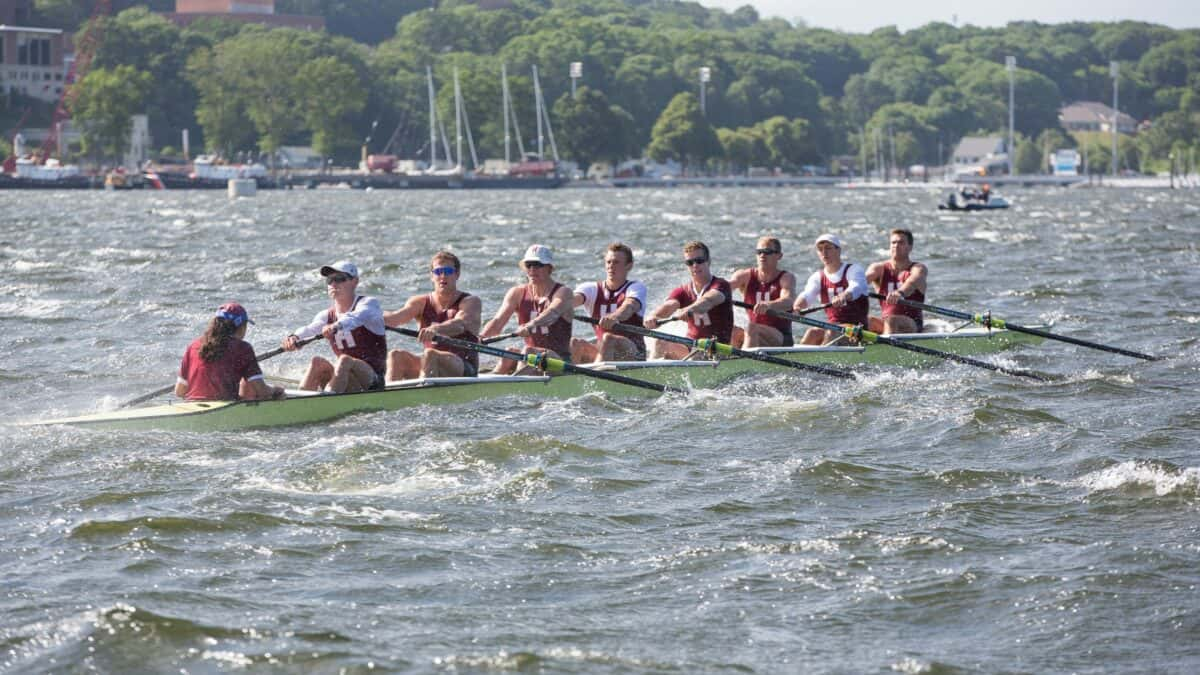
14 Jun 2016
Harvard sinks. Yale wins? The US Boat Race
“The conditions were very challenging,” Yale Head Coach Steve Gladstone told World Rowing. Despite the rough conditions, the Junior Varsity three-mile (4.8 km) and Third Varsity two-mile (3.2 km) races had already taken place (both Harvard victories) and all was set for the main rivalry between the First Varsity crews of Harvard and Yale.
“The referee decided to run the race with the authorisation of the coaches,” says Gladstone. “About half a mile into it, it was really rough and both boats took on water. In the Harvard boat, the seven man caught a crab that pulled the boat over and they stopped rowing.”
This is where things became contentious, he says. “The referee raised the red flag.” Yale, who were already in the lead, kept rowing, but then stopped as the Harvard rowers were being pulled from the water. “It became clear to them that they had to keep going,” says Gladstone of his Yale crew. “It was clear there was no point in going back, so they continued to row upstream, crossed the finish line and brought the boat in.”
[PHOTO src=”123668″ size=”mediumLandscape” align=”right”]
Records broken
Yale, who had captured last year’s event in a record winning time of 18:35.8, finished the 2016 contest with what would also be a new record, this time for the slowest winning time of 30:41. This result, however, might not count since officials declared a “non-race” only hours after what appeared to be a second straight win for Yale.
The 30+ km/h winds that persisted into the following day soon put a rest to speculation about an immediate re-row. But Gladstone believes there may still be a chance that the referee’s decision could be overturned by a ruling of the Regatta Committee. “The reality is that it is in flux,” he says.
“All in all, just from a human point of view, I am sure from both camps it was significantly anticlimactic and unsatisfying. In the Yale camp there was a sense that they wished they could have had Harvard on the course for the full four miles. But that wasn’t to be, so we have to move on.”
Whatever the final decision, the 151st meeting of Yale and Harvard is now one for the history books.
The weight of history
First rowed in 1852, “to test the superiority of the oarsmen of the two colleges”, the Harvard-Yale Boat Race is the oldest intercollegiate sporting event in the United States. Since then the event has taken place a total of 151 times; Harvard leads the series with 95 wins to Yale’s 55.
If Sunday’s “non-race” decision is upheld, it will be the first in the history of the regatta. If, on the other hand, Yale is granted the victory, it would be their first back-to-back win in over 30 years. Under Gladstone’s leadership Yale have regained a dominant footing, but it will need four decades worth of wins to recapture the lead.
This may sound ambitious, but it’s not unprecedented. Legendary Harvard coach Harry Parker lead his crews to 43 wins against Yale during his 50 years with the team. The tide may finally be turning in Yale’s favour.
Gladstone says the focus is on each year as it comes: “This event is such an important part of the racing calendar that I’m not sure whether the history or defending it or challenging it plays a role. It is a discrete entity and the attitude is can we win this year?”
“This is the 138th running in this location,” Gladstone says of the regatta site on the Thames River near New London, Connecticut. “These oarsmen are encamped in Gales Ferry or Red Top (Yale and Harvard’s permanent facilities) for weeks sometimes before these events. If you talk to a Yale or Harvard oarsman, I think their seminal experience will be the time they lived in Gales Ferry or Red Top.”
Although inspired by the Oxford-Cambridge Boat Race in the UK, there are some major differences says Gladstone. “This is a straightaway and there are poles that mark every half mile.In that sense it can be a contest right to the very end, whereas the Oxford-Cambridge race is settled sometimes halfway through the race.”
We now await the final outcome of race 151.

